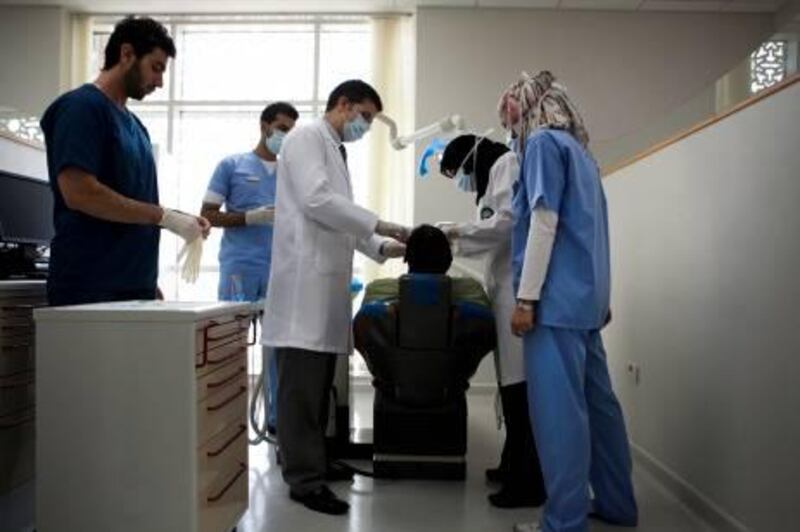SHARJAH // The emirate's first teaching hospital opened its doors last month and its dental section is already drawing hundreds of patients.
Opened just three weeks ago, the University of Sharjah's 114-seat dental hospital has received about 600 patients so far.
After paying Dh50 to register, patients can be seen free by fourth- and fifth-year students. Alternatively, private patients can be treated by qualified dentists.
With about Dh30 million of state-of-the-art equipment, it is a facility unrivalled in the region.
Dr Basheer Salman, a specialist oral surgeon who teaches at the university, will be among those using the university's laser surgery equipment, which allows for drill-free fillings that eliminate the need for anaesthetics and allow greater precision.
"This is of great benefit to both the patients and the students here," he said. "We can deal with so many more cases, more complicated cases and with so much more precision than ever before."
Dr Natheer Al Rawi, a teacher and oral pathologist at the hospital, said teaching methods were changing along with the new technology at their disposal.
"The teaching methods are being integrated into this new technology which other universities aren't yet using, so the students can enjoy learning in a new way, a more digital way."
The dental college has about 250 pre-clinical students - in their first three years of training - while the hospital has 180 clinical students.
Until last month, the college had a 30-chair dental clinic, which in the two years since it opened had treated about 9,000 patients, but the new unit represents a big step up.
"There is going to be a learning curve for everyone with all this new technology," admitted Dr Rani Samsudin, the dean of the dental college. "It's the unlearn and relearn process, where we are starting fresh."
Dr Samsudin is working towards getting the hospital accredited by the Joint Commission International in the US, an international hospital standards body. For now, it is running a course based on the one used by the University of Adelaide in Australia.
But he is keen for the hospital to retain its emphasis on its students rather than profits.
Dr Sausan Al Kawas, an associate professor at the college, said the students were now part of the real-world health system.
"This is not only about education but the student is part of the whole hospital system from the moment the patient walks through the door. You'd never see such a comprehensive and modern facility for students anywhere in the world."
Al Haitham Waleed, a 23-year-old fourth-year student, has seen about three cases a day in the last three weeks, more than he would have had access to in the old dental centre.
The new equipment allows better treatment, he said.
"From A to Z we can assess the patient and really see what their situation is rather than just treating their complaint," he said.
"We give everyone an X-ray when they arrive so we can treat in a much more holistic way than we could before, not just looking at one small problem."
Mohammed Saeed, 22, admitted it had been a "big change".
"We've gone from having around one clinical session a day to 12 in a week now," said the Emirati fourth-year student. "We get a lot more hands on experience than we ever did before. It's really good preparation for our work life."
He has been surprised how many patients have turned up to take advantage of the one-time Dh50 fee.
Already he believed he was better aware of the daily issues a dentist must deal with, from the general lack of oral hygiene awareness to the need to reinforce the importance of preventive action.
"Patients only come when they have pain," he said. "We need to teach people about preventive measures too."
The 210-bed hospital and dental hospital are funded by the university and the Government of Sharjah.
The hospital, only the second teaching hospital in the country after Gulf Medical University in Ajman, will offer a range of specialities including neurology, reconstructive surgery and paediatrics.
@ For more on SHARJAH, visit thenational.ae/topics






